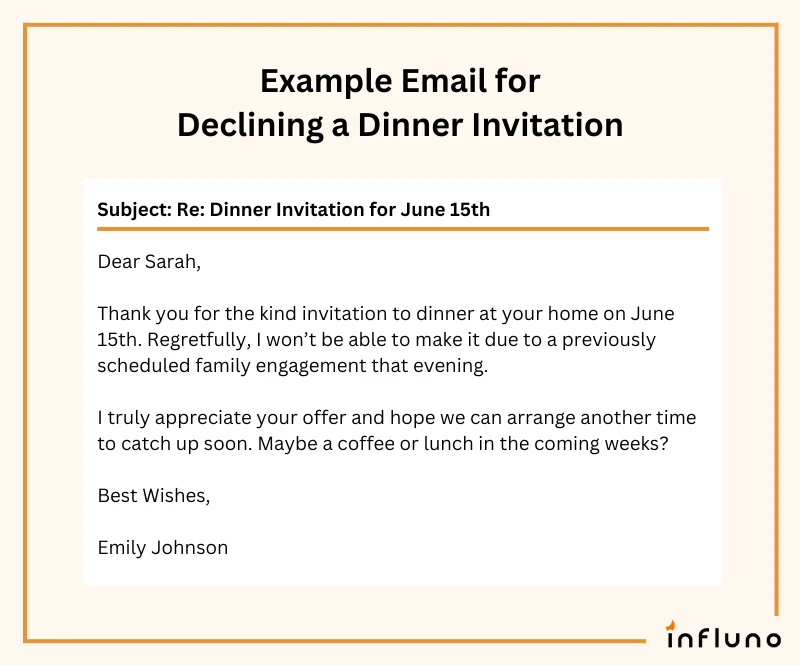How to Decline an Invite Politely: Simple Tips & Examples

Declining an invitation gracefully is an art that balances honesty with tact. Whether it’s a personal gathering, a professional event, or a social obligation, saying “no” without burning bridges requires thoughtfulness and consideration. Here’s a comprehensive guide to mastering this delicate task, complete with expert insights, real-world examples, and actionable strategies.
Understanding the Importance of a Thoughtful Decline
Saying “no” is often harder than it seems, especially when you value the relationship with the inviter. A poorly worded decline can lead to misunderstandings or hurt feelings. On the other hand, a well-crafted response reinforces mutual respect and leaves the door open for future interactions.
Expert Insight: According to etiquette expert Diane Gottsman, "A polite decline should always acknowledge the invitation and express gratitude before stating your inability to attend."
Key Principles for Declining Invites
- Be Prompt: Respond as soon as possible to avoid inconveniencing the host.
- Be Honest (but not overly detailed): Share a brief, genuine reason without oversharing.
- Express Gratitude: Always thank the inviter for thinking of you.
- Keep It Positive: Frame your decline in a way that doesn’t diminish the invitation’s value.
Step-by-Step Guide to Crafting a Polite Decline
Step 1: Acknowledge the Invitation
Start by thanking the inviter for including you. For example: "Thank you so much for inviting me to your dinner party."
Step 2: State Your Decline Clearly
Be direct but gentle. Use phrases like: "Unfortunately, I won’t be able to attend."
Step 3: Provide a Brief Reason
Offer a concise explanation without going into unnecessary detail. For instance: "I have a prior commitment that evening."
Step 4: End on a Positive Note
Show enthusiasm for future opportunities. Example: "I’d love to catch up soon—let’s plan something!"
Examples of Polite Declines
Personal Invitations
"Hi Sarah, thank you so much for inviting me to your birthday celebration. Unfortunately, I have a family obligation that weekend, but I hope you have an amazing time! Let’s grab coffee next week to celebrate."
Professional Events
"Dear Mr. Johnson, thank you for extending the invitation to the conference. I’m unable to attend due to a scheduling conflict, but I’d appreciate any materials you could share afterward. Looking forward to future opportunities to connect."
Social Obligations
"Hi Mike, thanks for thinking of me for the golf outing. I’m tied up with work that day, but I’d be happy to join the next time you plan something. Have a great game!"
Handling Persistent Inviters
Sometimes, a single decline isn’t enough. If the inviter presses for a reason or tries to change your mind, remain firm but polite. For example:
“I really appreciate your persistence, but I’m afraid it’s not possible this time. I hope you understand.”
Pros of a Firm but Polite Decline
- Maintains boundaries without damaging relationships.
- Shows respect for the inviter’s efforts.
Cons of Being Too Vague
- May lead to repeated invitations.
- Can create confusion or frustration.
Cultural Considerations
Declining invitations varies across cultures. For instance, in some Asian cultures, a direct “no” may be considered impolite, so a more indirect approach is preferred. Always consider cultural norms when crafting your response.
Key Takeaway: Cultural sensitivity is crucial when declining invites, especially in multicultural or international settings.
Future Trends: Digital Declines
With the rise of digital invitations, declining has become more streamlined. Platforms like Evite or RSVP apps often include pre-written decline options, but personalization is still key. A quick, heartfelt message goes a long way in maintaining relationships.
FAQ Section
How do I decline an invite without giving a reason?
+Keep it simple and polite: "Thank you for the invitation, but I won’t be able to attend. I appreciate you thinking of me."
Is it okay to decline a wedding invitation?
+Yes, but respond promptly and send a gift if possible. Example: "Congratulations on your special day! Unfortunately, I can’t attend, but I’ve sent a gift to celebrate with you."
How do I decline a last-minute invite?
+Be honest but kind: "Thank you for the invite, but I already have plans. I’d love to join next time!"
Can I decline an invite via text message?
+Yes, especially for casual events. Keep it brief: "Hi, thanks for the invite! I’m not available, but hope you have a great time."
Conclusion
Declining an invitation doesn’t have to be awkward or uncomfortable. By following these principles and examples, you can say “no” with confidence and grace. Remember, the goal is to honor your own commitments while respecting the inviter’s efforts. With practice, you’ll master the art of the polite decline, strengthening your relationships in the process.


